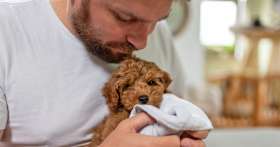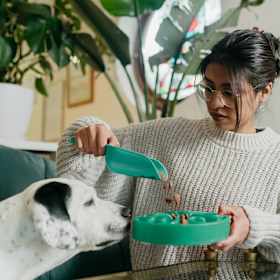Why Won’t My New Puppy Eat?
Here’s what to do when your puppy refuses to eat.
Here’s what to do when your puppy refuses to eat.
by Emily Johnson, | January 13, 2025

FreshSplash / iStock
Bringing a new puppy into your home is an exciting experience, but it can quickly turn concerning if they refuse to eat. A puppy’s lack of appetite can stem from various things, ranging from stress and environmental changes to health issues or simply being a picky eater. “Depending on the age of the puppy, a decreased or total lack of appetite could be a sign of a very serious problem,” says Dr. Chris Konvalinka, a veterinarian at Bahama Road Veterinary Hospital in Bahama, North Carolina, in an interview with Kinship. “It could be due to an infection, parasites, or even after swallowing a foreign object. But the list of possibilities is very long.”
In this guide, we’ll explore the common reasons your new puppy won’t eat and provide practical tips to help them develop healthy eating habits. Whether you’re dealing with a nervous eater or a finicky one, understanding the root cause — and taking the right steps to address it — can ensure your puppy grows strong, happy, and well-nourished.
There are several reasons why your new puppy may be turning up their nose at their food. Here are a few common ones to consider.
Some puppies are just picky when it comes to their food. They may prefer one flavor or texture over another, or they might be slow to adjust to the new type of food you’ve introduced to them. The size of kibble, wet versus dry foods, and changes in flavor can all impact a dog’s interest in food. This is common in puppies who are transitioning to a new diet or environment.
A change in environment can be a big source of stress for a puppy. Moving to a new home, meeting new people or pets, and getting used to new routines can affect how they eat. Puppies are sensitive to stress, and this can cause them to lose their appetite temporarily.

A trip to the vet is usually in order, because a puppy not eating is often one of the very first signs of an illness or other medical condition.
Sometimes, a puppy may not eat because of an underlying health issue, such as gastrointestinal problems or an infection. If your puppy is lethargic, vomiting, or showing other signs of illness alongside not wanting to eat, it’s important to contact your vet.
Just like human babies, puppies go through a teething phase. The discomfort from new teeth coming in can cause them to be less interested in food, especially if they’re eating dry kibble. Softening the food or offering alternative textures might help during this time.
If your puppy is overfed or fed too frequently, they may not feel hungry at mealtime. It’s important to establish a feeding routine and stick to appropriate portion sizes for your puppy’s age and breed.
If your new puppy isn’t eating, there are several things you can try to encourage them to eat.
If your puppy isn’t eating their current food, try switching it up. Some puppies are particular about taste or texture. You might want to try a different brand or flavor of food to see if that piques their interest.
Adding water or low-sodium broth to your puppy’s dry kibble can make it softer and more appealing, especially if they’re teething. It can also help with hydration if they’re not drinking enough water.
Warming your puppy’s food (either wet or dry) can enhance its smell and make it more appetizing. Puppies often find warm food more inviting, and the aroma will be more noticeable to them.
Puppies thrive on routine. Set regular feeding times, and offer the same food at the same times each day. This can help your puppy understand when mealtime is and encourage them to eat.
If your puppy is hesitant to eat from their bowl, try hand-feeding them. This can be especially helpful if they’re feeling anxious or stressed in their new environment. Hand-feeding also helps strengthen the bond between you and your puppy.
If your puppy is bored or simply uninterested in their food, you can try using a food puzzle or interactive feeding toy. These toys make eating more fun and stimulate your puppy’s brain, which can help them eat more efficiently.
Here is a checklist of things you can do to get them back on track.
Rule out health issues: If your puppy is also lethargic, vomiting, or showing other signs of illness, contact your vet. A lack of appetite could be due to an upset stomach or other health problems.
Track how long they’ve gone without eating: If your puppy refuses food for more than 12 to 24 hours, it’s time to call the vet. Not eating for this long can lead to dehydration and health risks.
Stay calm and patient: Puppies sometimes need time to adjust, especially to a new home. Keep calm and give them a peaceful environment to eat in.
Check their environment: Stress can affect a puppy’s appetite. Make sure their feeding area is quiet and comfortable, with familiar scents to help them feel at ease.
Keep up with hydration: Even if they’re not eating, it’s important your puppy is still drinking enough water. Add water or broth to their food, or encourage drinking by offering fresh water in a clean bowl.
Consult your vet if needed: If your puppy continues to refuse food, reach out to your vet to rule out medical issues or to get advice on different feeding strategies.
Generally, a healthy puppy can go without food for about 12 to 24 hours. However, if your puppy refuses to eat for more than 24 hours or shows any signs of distress, it’s important for a vet to see your puppy. Prolonged loss of appetite can lead to dehydration and other serious health issues.
It’s important to monitor your puppy’s portion sizes to make sure they’re eating an appropriate amount for their breed, age, and activity level. Overfeeding them can lead to obesity and digestive problems, while underfeeding can result in malnutrition. If you’re unsure about the right portion size, check with your vet (or look at the back of your puppy’s food bag) to find out the best feeding schedule and amount of food for your pup.
If your puppy is not eating enough, they risk becoming underweight. You can monitor their weight and condition by observing their ribs (which should be easily felt, but not visible) and checking for signs of lethargy or weakness. If your puppy seems to be losing weight or not growing as expected, it’s a good idea to consult your vet to rule out any underlying health issues.
“What to Do If Your New Dog Won’t Eat.” Maddie’s Fund, 2019, www.maddiesfund.org/what-to-do-if-your-new-dog-wont-eat.htm. Accessed 13 Jan. 2025.
“My puppy is refusing to eat her food.” JustAnswer, 2023, www.justanswer.com/dog-health/l27uc-puppy-almost-years-old-refusing-eat.html. Accessed 13 Jan. 2025.
“8 Reasons Why Your Dog Is Eating Treats but Not Food” Arvada Vet Hospital, 12 July 2024, arvadavethospital.com/blog/8-reasons-why-your-dog-is-eating-treats-but-not-their-food/.

Emily Johnson is a long-time pet writer and animal lover, working with brands like PetMD, Rover, Kinship, and more. She’s cared for dogs, cats, and horses her entire life and strives to help fellow pet parents through her content.

Adoption Advice

Adoption Advice

Adoption Advice

Pet Wellness
Curious about how to feed your new dog? This guide will answer your questions.

Behavior & Training

Behavior & Training
Set your new puppy up for success by creating house rules that establish boundaries and encourage good behavior.

Adoption Advice
Did you just bring home an adorable puppy?


Pet insurance
Lemonade highlights which puppy incidents (or non-illness-related accidents) top the list every year.